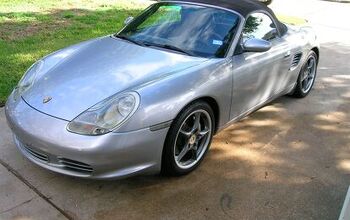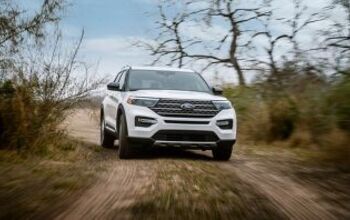Sales Of The Aging Electrics You Know Best Are Predictably Falling Fast
We’re accustomed to seeing outdated sports cars stumble as they age.
They’re as capable as they were when launched, of course, but demand for the cars often decreases rapidly. Those who were interested in the stylistic proposition already bought one. Those who saw them as paragons of performance encounter newer models with a greater dynamic portfolio.
Consider the Scion FR-S, sales of which plunged 23% in its second full year in the United States; sales of which declined 29% in the first four months of 2015.
Perhaps exacerbated by falling fuel prices, the sharp downturn in sales of two particularly famous, unconventionally powered hatchbacks is vaguely reminiscent of a sports car nameplate’s yo-yoing. A Camry-like ability to sustain demand right up until the new model arrives in dealers? Not for the Nissan Leaf and Chevrolet Volt.
Granted, the Volt’s decline began before old age. Launched during the same month, December 2010, as the Leaf, the Volt volume ramped up much more rapidly. 2,029 copies of the electric-plus-range-extended Volt were sold in the United States during the car’s first five months, compared with 1,044 Leafs.
Yet by March 2013, when the Volt was 28 months into its first-generation, year-over-year volume plunged 35%. That began a three-month streak of decline for the Volt. In calendar year 2013, Volt sales decreased by less than 2%; declining in seven of twelve months.
Looking back from April 2015’s 42% year-over-year decline, Volt volume has decreased in the United States in nine consecutive months, in twelve of the last 16 months, and in 19 of the last 26 months.
The Leaf’s downturn is much more recent. After posting annual increases in each of its first four years – including a 130% jump in 2013 and a 34% increase last year – Leaf volume has declined in each of 2015’s first four months.
The 15% drop in January resulted in just 1,070 Leaf sales, the lowest total for the all-electric Nissan in two years. February sales fell 16%. March volume plunged 38%, a drop of 690 sales. In April, Leaf sales slid sharply once again, with a 26% decline measuring a loss of 535 sales. Preceding this four-month streak was a 23-month-long span in which Leaf sales consistently improved on a year-over-year basis.
Many electric cars are ultra-low-volume portions of a high-volume vehicle’s lineup. Tesla infamously doesn’t release detailed monthly sales reports. ( HybridCars.com estimates 6,800 Model S sales in the U.S. through the first four months of 2015, a 26% improvement.) The Model S, while never fully replaced during its near three-year lifespan to date, is markedly different from the Leaf and Volt in the sense that Tesla constantly provides significant updates to the car and the Model S lineup. Predictably, during its phasing-out, U.S. sales of the first Toyota Prius Plug-In, a vehicle which posted an annual peak of 13,263 units just last year, is down 66% to 1,699 sales.
Timothy Cain is the founder of GoodCarBadCar.net, which obsesses over the free and frequent publication of U.S. and Canadian auto sales figures. Follow on Twitter @goodcarbadcar and on Facebook.
More by Timothy Cain
Latest Car Reviews
Read moreLatest Product Reviews
Read moreRecent Comments
- Carson D It will work out exactly the way it did the last time that the UAW organized VW's US manufacturing operations.
- Carson D A friend of mine bought a Cayenne GTS last week. I was amazed how small the back seat is. Did I expect it to offer limousine comfort like a Honda CR-V? I guess not. That it is far more confining and uncomfortable than any 4-door Civic made in the past 18 years was surprising. It reminded me of another friend's Mercedes-Benz CLS550 from a dozen years ago. It seems like a big car, but really it was a 2+2 with the utilitarian appearance of a 4-door sedan. The Cayenne is just an even more utilitarian looking 2+2. I suppose the back seat is bigger than the one in the Porsche my mother drove 30 years ago. The Cayenne's luggage bay is huge, but Porsche's GTs rarely had problems there either.
- Stanley Steamer Oh well, I liked the Legacy. It didn't help that they ruined it's unique style after 2020. It was a classy looking sedan up to that point.
- Jalop1991 https://notthebee.com/article/these-people-wore-stop-signs-to-prank-self-driving-cars-and-this-is-a-trend-i-could-totally-get-behindFull self stopping.
- Lou_BC Summit Racing was wise to pull the parts. It damages their reputation. I've used Summit Racing for Jeep parts that I could not find elsewhere.




































Comments
Join the conversation
No surprise with either of these: the Volt is being replaced with a superior 2016 model; and the Leaf faces scads of strong competitors in the mass-market all-electric segment, vs zero such competitors when it first came on the market. I think sales of both, and even sales of PHEVs and hybrids, may also be suffering slightly as people consider waiting for the Chevy Bolt. With 200 miles of range, an affordable sticker, and a couple more years of infrastructure build-out in the meantime, the Bolt promises to be an honest-to-God game-changer like nothing since the Prius.
I was just in the Atlanta area and I'm convinced that Nissan sold all the Leafs( Leaves?) there. Granted, there is more population and more money in Atlanta, plus a more temperate climate than in Pittsburgh. But I saw at least 20 Leaf's in about 200 miles of driving over 4 days and I'm 99% certain they weren't all the same one. Only a few Volts and I'd say more Leaf than Prius even. I even saw one Leaf behind another at a light! I'd take a Leaf or some other pure electric if there was the infrastructure to deal with it. My car sits at the airport for days at a time and then I drive it home. My wife drives my car about 15 miles roundtrip for work when I'm home, leaving me the Odyssey for kid duty. We have the Odyssey for family/kid/roadtrip duties. But there are no chargers in the extended term lot where I park. I'm sure they're in the short term garage, but I can't get a parking pass for that as an employee. Chargers are few and far between anywhere in Pittsburgh. Maybe once the infrastructure catches up and/or the price comes down, but I won't entertain 100% electric until that point.